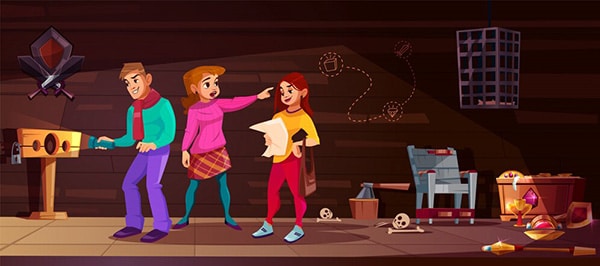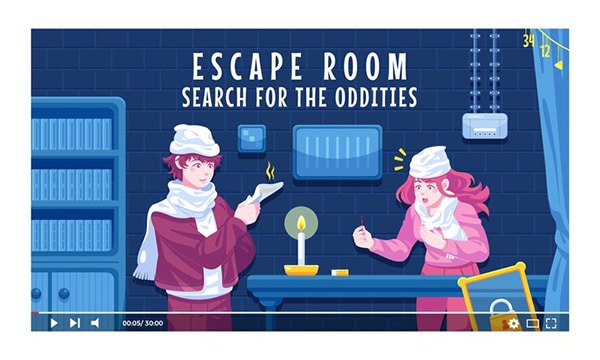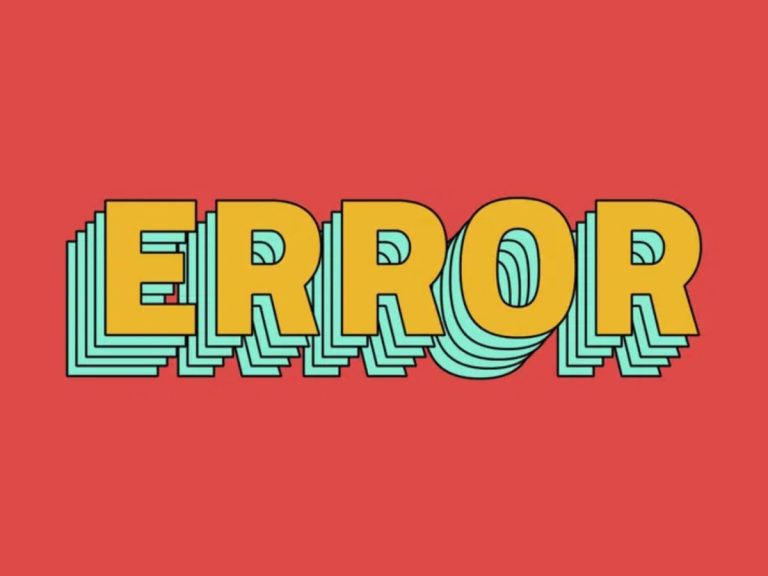Understanding the Common Types of Escape Room Puzzles
Have you ever found yourself locked in a room, tasked with solving a series of mind-boggling puzzles before time runs out? If you have, then you’ve probably experienced the thrill of an escape room! Escape rooms have been gaining popularity over the years and for good reason. They offer a unique blend of teamwork, problem-solving, and sheer adrenaline-pumping excitement.
At Entermission, we make sure your adventures are as thrilling and memorable as possible. Our innovative puzzles are designed to challenge your problem-solving skills and keep you on the edge of your seat as you work together with friends, family, or colleagues to find a way out! So, what are you waiting for? Get ready to test your wits and take on the challenge! Good luck!
But before embarking on your mission, remember the key to success in an escape room is understanding the various puzzles that can be thrown your way. In this blog post, we’ll take a deep dive into the common types of escape room puzzles and provide some tips to help you tackle them like a pro. Let’s get started!
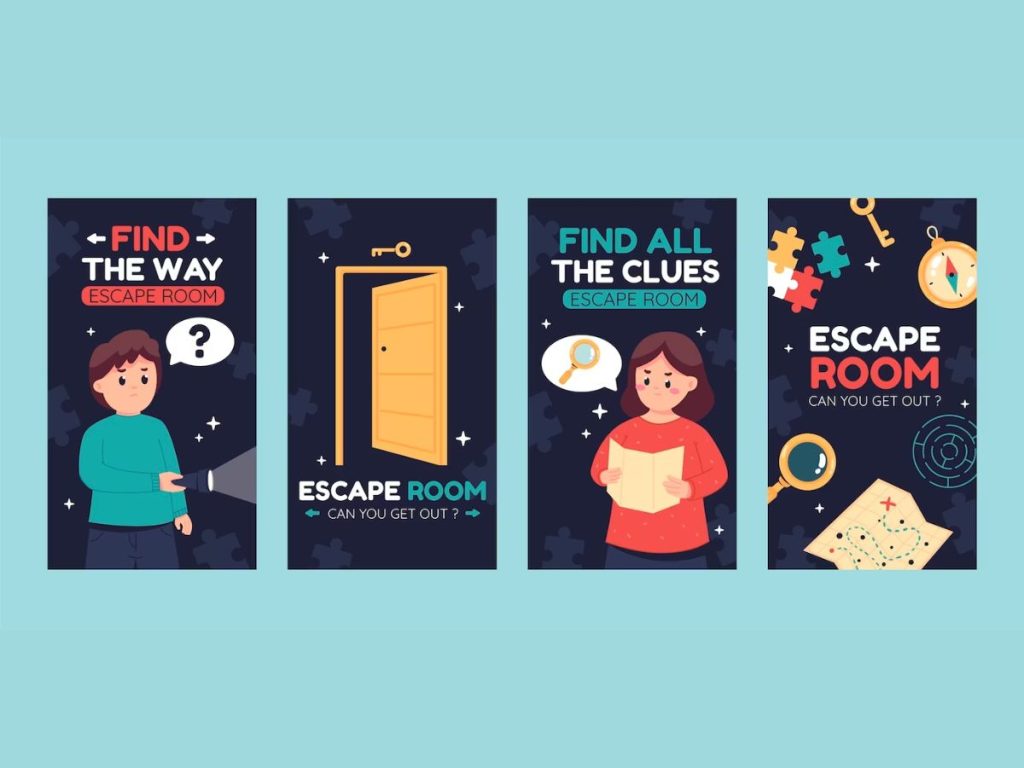
What Questions Are Commonly Asked in An Escape Room?
In an escape room, you’ll be faced with a variety of questions that require critical thinking and creativity to answer. These questions are designed to test your wits and keep you on your toes. Some of the most common escape room questions are:
- What is the significance of the number sequence on the wall?
- How can you arrange these items in a way that unlocks the door?
- What does the map on the table reveal about the room’s hidden passageways?
Tips for answering escape room questions:
Answering escape room questions is the key to beating the timer. Here are some crucial tips to help you solve escape games like a pro.
- Take a step back and look at the bigger picture. Sometimes, the answer lies in connecting the dots between seemingly unrelated elements.
- Communicate with your teammates. Two (or more) heads are better than one!
- Don’t be afraid to think outside the box – escape rooms are designed to challenge conventional thinking.
- Stay calm and focused. Panic is your worst enemy in an escape room.
- Remember that each puzzle is designed to be solved, so don’t give up easily!
- Divide and conquer. Assign different puzzles to different team members based on their strengths.
Tips and guidelines for using your phone in an escape room.
What Are The 7 Common Escape Room Puzzles?
Escape rooms feature a wide range of puzzle types, but there are seven common categories that you’re likely to encounter. Here’s a quick rundown:
- Logic puzzles: These require you to use deductive reasoning to solve problems. For instance, solving a riddle to reveal a hidden message.
- Math puzzles: As the name suggests, these involve math skills to crack codes or decipher sequences. Example: Solving an equation to unlock a combination lock.
- Physical puzzles: These puzzles require you to manipulate objects or complete tasks using physical skills. Examples include assembling a jigsaw puzzle to reveal a clue.
- Hidden object puzzles: Your mission is to find concealed objects in the room. Locating a hidden key within a bookshelf is a great example.
- Pattern recognition puzzles: These puzzles require you to identify patterns in order to solve the problem. Take decoding a series of symbols to reveal a message, for instance.
- Cipher puzzles: You must decode secret messages using substitution, transposition, or other encoding techniques. Decrypting a message using a Caesar cipher is the perfect example.
- Teamwork puzzles: These puzzles require collaboration and effective communication. For instance, solving a puzzle that requires multiple people to perform tasks simultaneously.
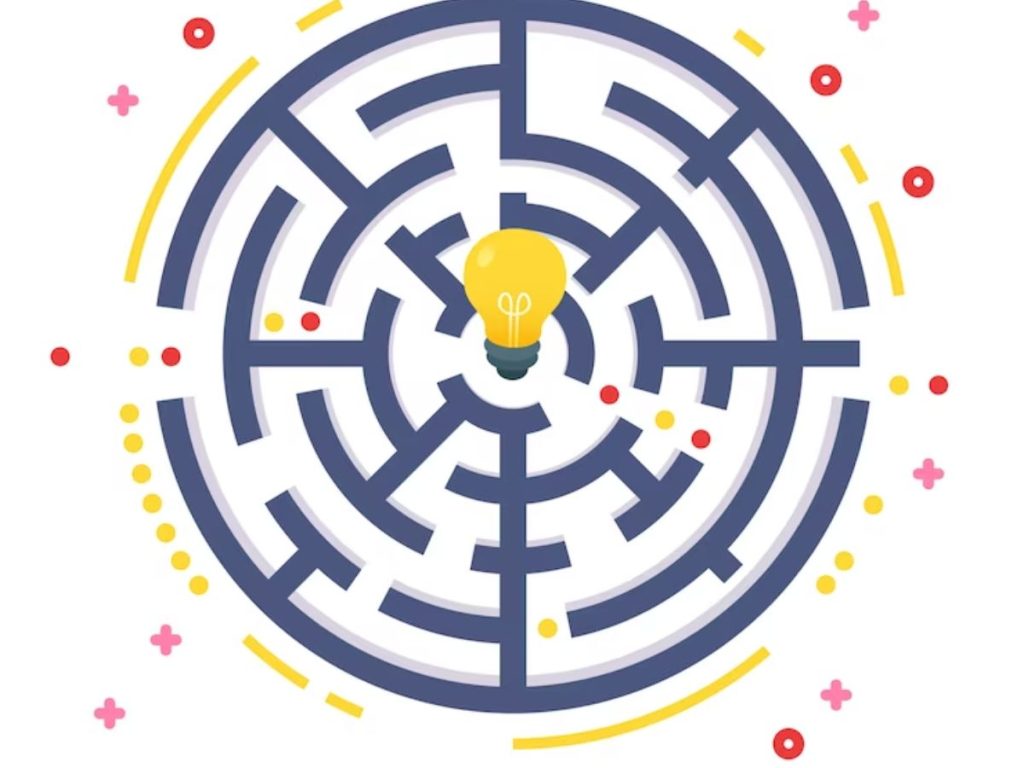
How Do You Find Clues in An Escape Room?
Clues are the lifeblood of any escape room, and finding them is crucial to solving the puzzles. But where do you look? Escape rooms can hide clues in interesting places like:
- Behind paintings or framed pictures
- Underneath objects or furniture
- Within books or other written materials
When searching for clues inside an escape room, you must:
- Be thorough and systematic. Search every nook and cranny to ensure nothing is overlooked.
- Communicate with your teammates about the clues you find to avoid duplicating efforts.
- Keep an open mind, as clues can sometimes be hidden in plain sight!
What Are the Best Clues for Escape Rooms?
The effectiveness of a clue in an escape room depends on its ability to provide just enough information to guide you towards solving the puzzle.
Examples of effective clues:
- A riddle that provides a hint about where to find a hidden object
- A series of symbols that, when deciphered, reveal the solution to a puzzle
- A clue that requires teamwork to understand its full meaning
Tips for creating and using effective clues in an escape room:
- Design clues that require players to think critically and use their problem-solving skills.
- Make sure clues are clear and concise but not so obvious that they give away the solution.
- Balance the difficulty of clues to create a challenging yet enjoyable experience for players.
What Are Follow-Up Questions for Escape Rooms?
Follow-up questions are essential in escape rooms, as they help players dig deeper into the puzzles and uncover additional layers of information.
Examples of follow-up questions:
- What does this clue mean in the context of the overall puzzle?
- How does this new piece of information relate to the other clues we’ve found?
- What additional steps do we need to take to solve the puzzle?
Tips for asking and answering follow-up questions in an escape room:
- Always be prepared to ask follow-up questions when solving puzzles to ensure a thorough understanding of the situation.
- Encourage open communication within the team to facilitate effective problem-solving.
- Don’t be afraid to revisit previous clues or puzzles in light of new information.
How Should I Prepare for Escape the Room?
Proper preparation is key to having a successful escape room experience. here are some pro tips for preparing mentally and physically for an escape room:
- Get a good night’s sleep before the big day to ensure you’re well-rested and ready to tackle puzzles.
- Brush up on your problem-solving, logic, and teamwork skills to be better prepared for the challenges ahead.
- Dress comfortably and wear shoes that allow you to move freely.

Are You Ready to Put Your Puzzle-Solving Skills to The Test?
Understanding the common types of escape room puzzles is essential to enhance your problem-solving skills and increase your chances of success. Remember that communication and teamwork are crucial in solving these puzzles, so work together and keep an open mind.
We hope this blog post has provided you with valuable insights into the world of escape room puzzles. Now that you’re armed with this knowledge, we encourage you to try out different types of puzzles and see how much fun you can have while honing your problem-solving skills. Why not start with Entermission Sydney? Good luck, and happy escaping!
Don’t wait any longer! Book an escape room experience at Entermission Sydney now! Our immersive, cutting-edge virtual reality technology will transport you to a whole new world of excitement and intrigue.
Join forces with your friends, family, or colleagues and see if you have what it takes to escape before time runs out. Click the link below to book your exhilarating Entermission escape room experience now, and prepare for a thrilling, mind-bending journey that you won’t soon forget!
Book Your Entermission Sydney – Virtual Escape Room Experience Now!
FAQ
What Questions Are Asked in An Escape Room?
Escape rooms are notorious for throwing a wide range of questions at players with the intention of testing their critical thinking and problem-solving skills. You might encounter riddles, mathematical problems, or even questions that require you to think outside the box. Remember, communication is key, so work together with your teammates to crack these brain-teasers! After all, two heads are better than one, right?
What Are The 7 Common Escape Room Puzzles?
Ready for a crash course in escape room puzzles 101? Here are the seven common types you’ll likely come across:
- Logic puzzles (riddles, deduction, and reasoning)
- Math puzzles (equations, sequences, and calculations)
- Physical puzzles (manipulating objects or completing tasks)
- Hidden object puzzles (finding concealed items)
- Pattern recognition puzzles (identifying patterns and sequences)
- Cipher puzzles (decoding secret messages)
- Teamwork puzzles (collaborative problem-solving)
Keep your eyes peeled for these types of puzzles, and remember: practice makes perfect!
How Do You Find Clues in An Escape Room?
Clues, clues, everywhere! But where do you look? Finding clues in an escape room can be a bit like searching for a needle in a haystack, but with a keen eye and a systematic approach, you’ll be a clue-finding machine in no time. Make sure to search high and low, behind objects, and even within written materials. And don’t forget to communicate with your teammates; sometimes, it takes more than one pair of eyes to spot that elusive clue.
What Are the Best Clues for Escape Rooms?
The best clues in escape rooms are those that strike a perfect balance between being informative and challenging. They should guide players towards the solution without giving away too much. Some examples include riddles that hint at a hidden object’s location, decipherable symbols, or clues that require teamwork to understand fully. A great clue is like a breadcrumb trail – just enough to keep you moving in the right direction!
What Are Good Follow-Up Questions for Escape Rooms?
Follow-up questions in escape rooms help players dig deeper into the puzzles and uncover additional layers of information. They might ask things like:
- How does this new clue relate to the other clues we’ve found?
- What additional steps do we need to take to solve the puzzle?
Remember, asking follow-up questions can make all the difference between getting stuck and making progress. So don’t be shy, and keep that curiosity alive!
How Should I Prepare for An Escape Room Experience?
Preparation is the secret sauce for a successful escape room adventure! To ensure you’re ready to tackle those puzzles head-on, make sure to:
- Get a good night’s sleep – you’ll need all your mental prowess.
- Brush up on problem-solving, logic, and teamwork skills.
- Dress comfortably and wear shoes that allow for easy movement.
- And finally, don’t forget to bring a positive attitude and an open mind. Now go forth and conquer those escape rooms!

